Startups On Our Radar spotlights African startups solving African challenges with innovation. In our previous edition, we featured seven game-changing startups pioneering sales management, customer support, sports tracking, and event ticketing. Expect the next dispatch on November 21, 2025.
This week, we explore seven African startups in the travel, legal, creative economy, education, and job application sectors and why they should be on your watchlist. Let’s dive into it:
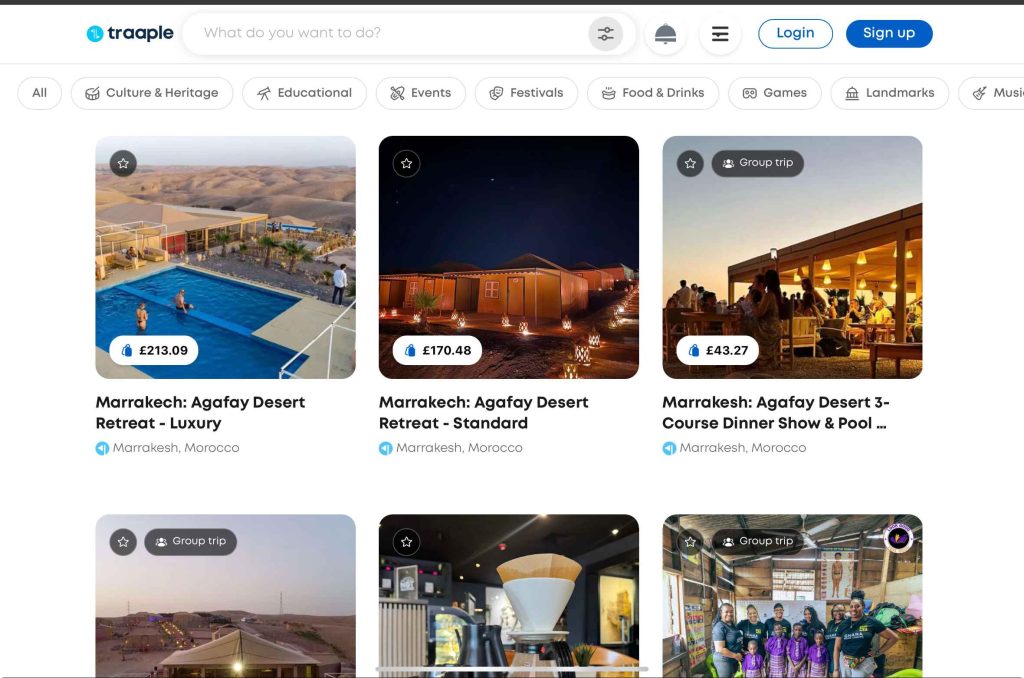
Traaple wants to be the one-stop shop for African travel experiences (TravelTech, Ghana)
Trapple was founded by Selase Kove-Seyram, a former video producer who travelled extensively across the continent for outlets like the BBC and New York Times. He identified that information about travel in Africa is super fragmented. He explains that, unlike in Europe or North America, guidebooks get outdated quickly, and finding experiences usually relies on personal networks, offline sources, scattered Google results or influencers who showcase destinations but can’t provide a direct path to booking. Trapple aims to become the continent’s venture-sized solution for discovering and booking experiences by offering a structured and trusted marketplace for travellers and experience providers.
Trapple consists of three integrated tools: a consumer mobile app for iOS or Android, a web app, and a supplier dashboard. The app is built around discovering and booking experiences, targeting diaspora travellers, urban locals, companies seeking team-bonding activities, and conference attendees. Users can discover experiences based on their interests and location, browse categories like day tours, nightlife, art, cooking, and must-try recommendations, and they can book those experiences directly. The app features a community tab where creators, travellers, and influencers share insights and answer location-specific questions.
Trapple vets every experience provider to maintain quality and trust and partners with hotels, who display Trapple QR codes in their rooms and front desks so visitors can browse things to do instantly. The startup also works with vehicle owners to provide cars for bundled experiences. Trapple launched in Accra on September 25, where it has already onboarded vetted suppliers and curated experiences, and has secured an endorsement from the Office of Diaspora Affairs.
Trapple makes money through commissions, typically taking 15% from each experience provider or supplier per booking. For bundled services, where Trapple negotiates discounted rates due to high-volume referrals, commissions can range from 10% to 30%. Its model mirrors a marketplace like Uber, where Trapple supplies demand and infrastructure, and providers earn income while giving up a percentage per transaction.
Why we’re watching: Africa’s travel and tourism market value is expected to surpass $35.98 billion by 2030. Trapple is building the kind of structured experience marketplace that African cities have long lacked. It is positioning itself as the critical hyperlocal infrastructure layer that global players like Booking.com, Expedia, and GetYourGuide lack. Trapple works directly with creators, chefs, tour guides, and niche experience providers to design offerings unique to each city rather than offer generic experiences. Trapple is planning a Lagos expansion and shifting its strategy from Accra’s tour-focused diaspora market to ticketing for exclusive December parties and events in Lagos.
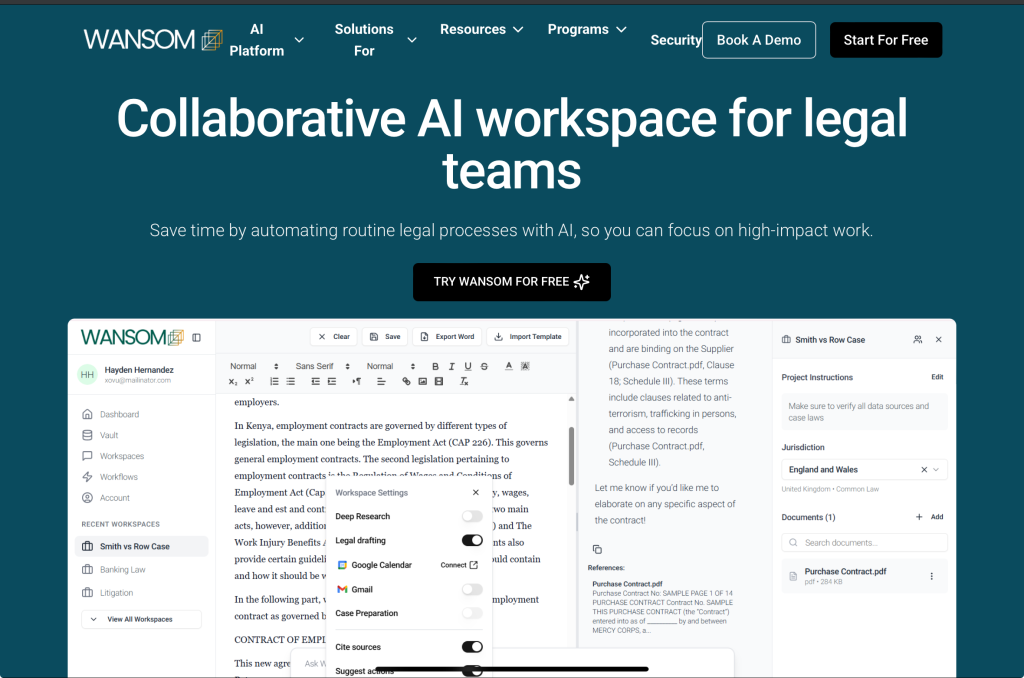
Wansom AI is a collaborative AI workspace for legal teams (LegalTech, Kenya)
Wansom AI is building a platform to address the legal industry’s core concerns that generic AI tools can’t guarantee client-attorney privilege nor support real-time team collaboration. Wansom AI, founded by Warren Ochieng and built by a team of software engineers, legal practitioners, and AI specialists, grew out of years of selling legal templates to law firms and seeing how much time drafting and review consumed.
Wansom’s solution is a secure, collaborative workspace designed for global legal teams that allows them to draft documents, review contracts, carry out research, onboard clients, and manage matters in real time. The platform uses a blend of open-source models, GPT-class models, and jurisdiction-specific legal AI to deliver highly detailed outputs. Wansom allows users to organise work into case or matter folders, give the AI a case number, and have team members collaborate live in the same workspace. Lawyers can start a draft from scratch or upload an existing template, ask the AI to edit, review, or correct the document, and get an updated version instantly through the embedded MS-Word-like editor.
A core feature is its jurisdiction-specific intelligence, where users can pick a jurisdiction or country, and the AI will respond based on the country’s legal frameworks. The system is intentionally strict, reviewing documents, flagging errors, and suggesting corrections.
The product is designed around strict confidentiality. The company emphasises that client data is never used for model training, as it encrypts data uploaded into projects, and gives firms the option to customise AI workflows. The company says over 3,000 lawyers across 20 firms use its AI, which supports 11 jurisdictions and is backed by a team of 25 legal experts.
Why we’re watching: Wansom AI stands out by combining legal-specific AI models with a real-time collaborative workspace, something generic AI tools cannot offer with the same level of confidentiality or jurisdictional precision. The ability to fine-tune outputs by jurisdiction, simulate case outcomes, automate due diligence, and integrate email and calendars makes Wansom AI a robust legal operations layer.
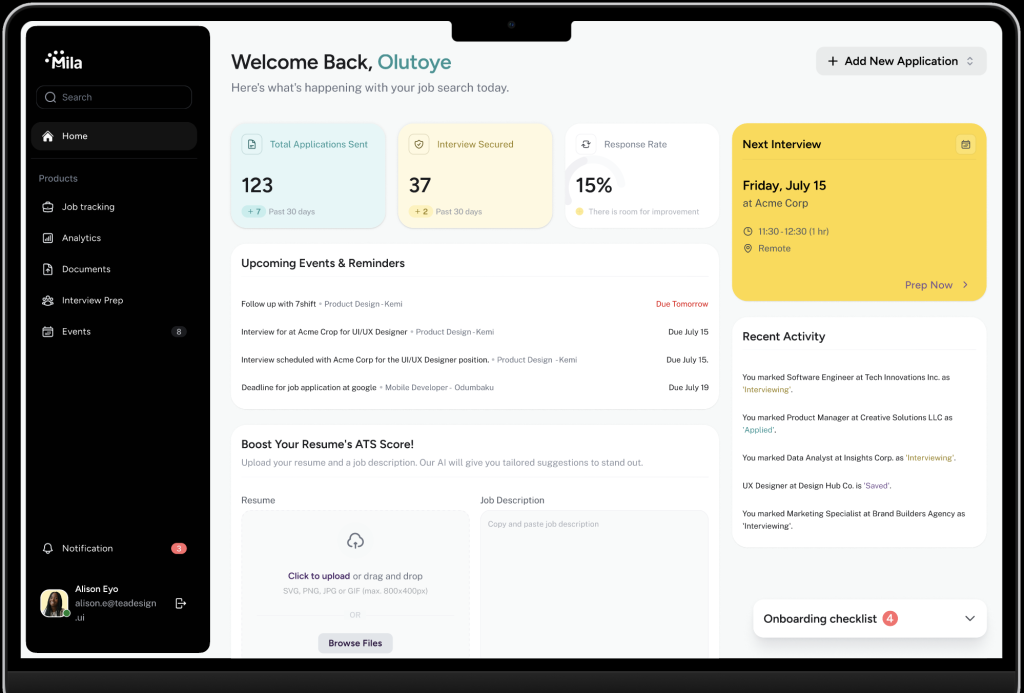
Mila is an AI-powered job application tracker (HRTech, Nigeria/UK/USA)
For job seekers, applying for positions can quickly become overwhelming, a struggle founder Aaliyah Ajoboh knows too well. Ajoboh describes applying for jobs as a numbers game where candidates must manually tailor CVs for multiple roles, track applications in spreadsheets, and suffer inboxes clogged with employers’ communication. Even with a methodical approach, Ajoboh observed from people around her that job seekers still missed opportunities.
Mila leverages AI to centralise and automate this complex process, making it manageable. The product acts like an all-in-one job tracking system that connects to a user’s email and job boards like LinkedIn, Indeed, and Glassdoor to automatically pull applications and email confirmations onto a dashboard, and allows users to sort between stages of the application process through an interactive Kanban-style interface. Ajoboh emphasises that the AI is programmed to only pick selected keywords related to jobs and is not reading all user emails.
The tool can also analyse and optimise resumes for specific roles and ensure they can pass through automated tracking systems (ATS). Additional tools offered by Mila include interview preps, mock interviews, and reminders for follow-ups.
Why we’re watching: Mila is potentially replacing the disorganised, multi-tool chaos of modern job seeking. By centralising all job applications in one dashboard and offering AI-driven insights on follow-ups and outcomes, it promises to save users time and stress. Mila is currently in the final stages of developing its MVP, with over 60 early signups for beta testing scheduled to begin in December 2025. The platform will run on a freemium model, where basic features and up to 20 applications are free, and a premium subscription unlocks full access to the tool. Pricing will be localised, with monthly subscriptions ranging from $15–$20.

Sane AI wants to prevent mental health crises with its AI monitoring platform (Healthtech, Nigeria)
Sane AI was founded by Victor O. Babatunde, Boluwatife Adekola-Ojo, and Gbotemi Bukola Babatunde. The idea dates back to 2020, when Babatunde experienced a severe period of depression after losing his life savings to a failed investment. His recovery, supported by the woman who would later become Sane’s clinical co-founder, shaped his understanding of how difficult early detection and accessible support can be. The startup aims to tackle the high cost of therapy, and believes that access to quality monitoring and tailored care tools can save costs for individuals who need them.
Their flagship product, Companion, is an AI-driven mental health assistant that checks in daily with users through push notifications and voice or text conversations. Companion listens, detects signs of mental health strain, and logs patterns over time. Users can engage in a voice or text conversation with the AI, which learns the user’s context and helps them identify their moods. The app also provides non-critical support like journaling tools and goal-setting features.
If a user needs more than self-guided support, Sane routes them to human therapists within its partner network. For high-risk situations involving suicidal statements, the system immediately provides emergency contact prompts, helplines, and next-step guidance. There are plans in the works to allow users to add personal emergency contacts for situations like this.
Why we’re watching: Across Africa, over 150 million people are estimated to be living with mental health conditions, with only 1·4 mental health workers per 100,000 people. Sane is trying to reduce instances of mental health crises with its platform. Sane’s core differentiator is its focus on prevention and monitoring rather than just treatment. The startup positions itself as the critical diagnosis layer that provides quality insights for further medical action. While existing mental-health platforms focus heavily on therapy sessions, Sane targets the layer that comes before crisis.
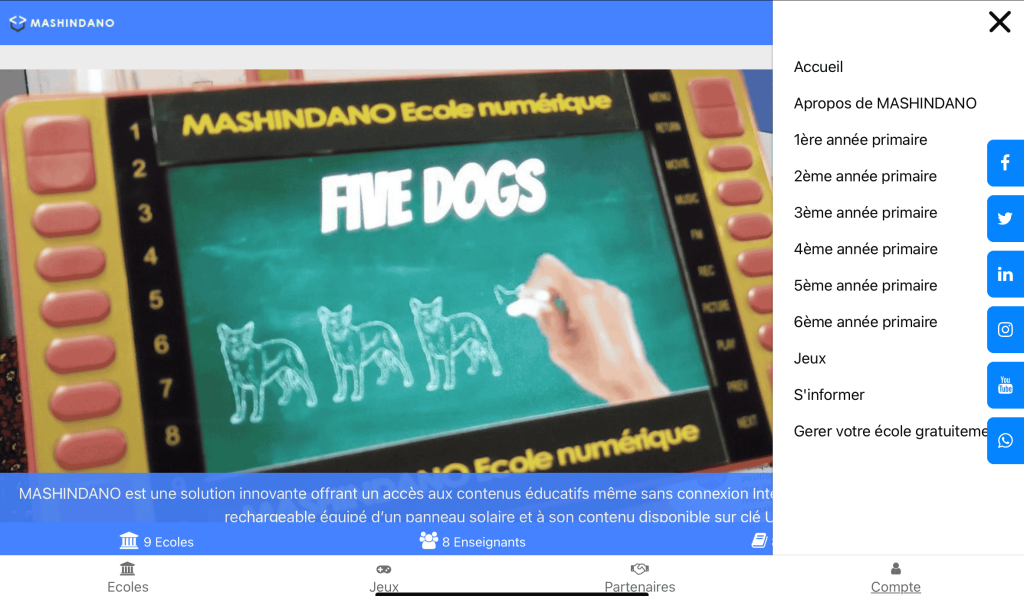
Mashidano wants to educate underserved children (Edtech, Democratic Republic of Congo)
Founded in 2021 by software engineer Tsongo Mira Tshisola, Mashidano is tackling education across multiple levels. The startup targets two distinct educational challenges. The first is a lack of access and means for children in rural areas. Mashidano offers children in this category, often without power or internet access, a solar-powered video player with educational content loaded and stored on a flash drive. Families receive the device along with printed learning exercises for them to administer. After a set period, the team travels back to assess the child’s progress. If the child has made progress, new educational materials for a higher grade will be delivered to the household.
Mashidano’s second challenge is children in urban areas with little digital skills or expertise. Mashidano For them, Mashidano has a digital learning platform for computers and smartphones that features content for primary school (P1 to P6), designed in-house or sourced from external curriculum creators like teachers. To drive engagement, it offers weekly game quizzes and rewards winners with internet data. The platform is free to build popularity among users. The startup claims to have partnered with the NGO Vijana Africa, which uses the platform on tablets in primary schools.
Why we’re watching: The United Nations Children’s Fund (UNICEF) says that over 1.6 million children in eastern DRC are out of school due to violence and displacement. Mashidano is bridging this gap by bringing education to children without demanding payment. Its dual-infrastructure model, which includes solar-powered offline video players for villages and a mobile learning hub for towns, allows it to reach children typically left behind by online-only edtech solutions. The company’s main challenge has been funding, which has limited its ability to service rural areas. Its focus is on raising funds and monetisation, with a plan to implement an API for a premium version and paid training for professional education content. The long-term vision is to evolve into an ecosystem that enables other educators to post content while Mashidano takes a small commission on transactions.

Divyd wants to take the awkwardness out of splitting bills (FinTech, Nigeria)
Founded by Ibukunoluwa Kayode and Subomi Otusanya, Divyd was created to solve a simple problem they faced: the awkward process of splitting bills among friends or large groups in Nigeria. The problem also extends to shared subscriptions like Netflix or Apple Music, where one person pays and the others on the shared account forget to refund small amounts, forcing friends into the uncomfortable position of asking for their money back. Their app lets users split everyday expenses from restaurant outings, ride-hailing fares, shared gifts, or other group activities, and automates monthly or weekly subscription splits for services like Netflix, Apple Music, and Prime.
For it to work, a Divyd user funds their Divyd wallet, pays the bill, and then creates a bill to tag friends, who must also be on the app, using their usernames or email addresses for their specific shares. Once tagged, users accept the bill, and the exact amount is deducted from each person’s wallet, automatically crediting whoever paid first. If a user doesn’t have money in their wallet, the bill is marked “pending,” and Divyd sends them daily reminders until they top up. Alternatively, the group can collectively pay for a service at the point of payment, with the app pulling each person’s share from their respective wallets simultaneously. For recurring subscriptions, the app advises the bill creator to remove a user if they miss three consecutive payments.
The product is awaiting approval from Google Play and App Store before launch, which is targeted for December 2025. Divyd will generate revenue through small transaction fees on wallet funding and payouts.
Why we’re watching: Divyd is entering the fintech space with a simple but highly relatable wedge of everyday group payments. While the app leverages Kora Pay’s API for real-time transactions and payouts, its proprietary logic handles complex bill distribution, scheduled debits, and automated reminders. The team’s immediate plan post-launch is to gather user feedback before building future iterations, which include direct card linking and an advanced receipt-scanning feature that allows users to assign specific line items on those receipts to friends to solve the problem of price splits.
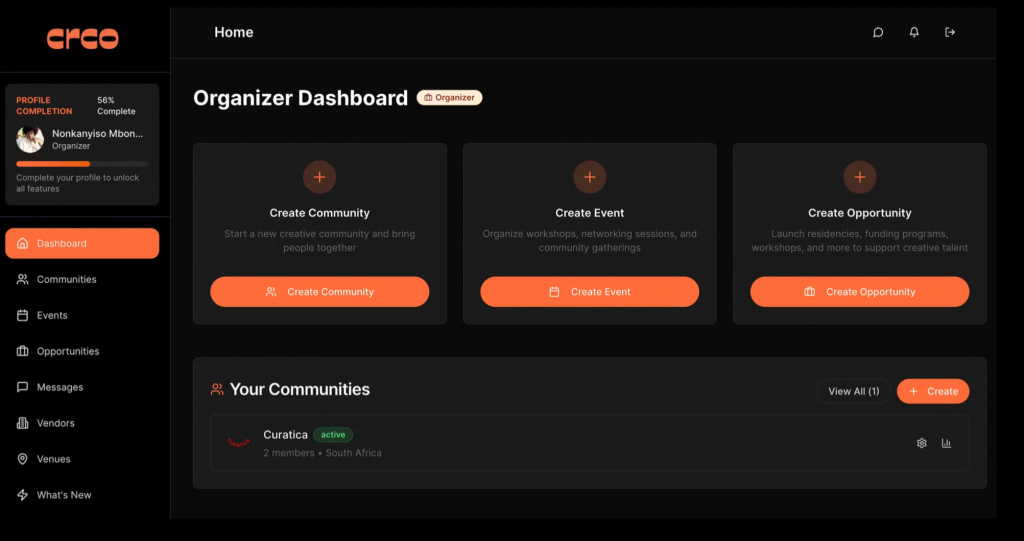
CRCO wants to unify Africa’s creative economy (Creator Economy, South Africa)
Founded by Dillion S. Phiri, CRCO (pronounced crreecoo) is a community operating system born from over 15 years of the founder’s direct experience in the industry. Phiri first built Creative Nestlings, a non-profit organisation that supports creativity and innovation in youths, into a network of over 100,000 creatives and has helped curate major creative festivals such as Fak’ugesi Festival, a digital creativity festival in Johannesburg. During that journey, he and his team repeatedly ran into the same problem: the many disconnected tools, many of which were non-African, required to hold a community together.
Phiri’s solution is CRCO, a single, integrated platform for community building, event management, and opportunity discovery. For organisers, this central dashboard allows them to manage the entire event lifecycle, including selling tickets, finding, hiring, and paying vendors and venues directly on the platform. Creatives and attendees, in turn, get a centralised place to discover new opportunities, events, and networks that are currently buried across multiple apps.
The platform operates on a freemium model and generates revenue from transaction fees or commissions on ticket and merchandise sales, subscriptions for premium features like advanced analytics, and advertising.
Why we’re watching: Africa’s creative sector is said to generate $4.2 billion annually. CRCO is tapping into this market by building a platform grounded in lived experience and years of ecosystem work. It faces a fragmented landscape of global competitors like Eventbrite and Discord, and local ticketing platforms like Tix Africa, but CRCO’s holistic approach is its key differentiator, which brings together communities, events, and opportunities where others offer single solutions.
That’s all for today. Expect our next dispatch on October 17th. Know a startup we should feature next? Please nominate here.








